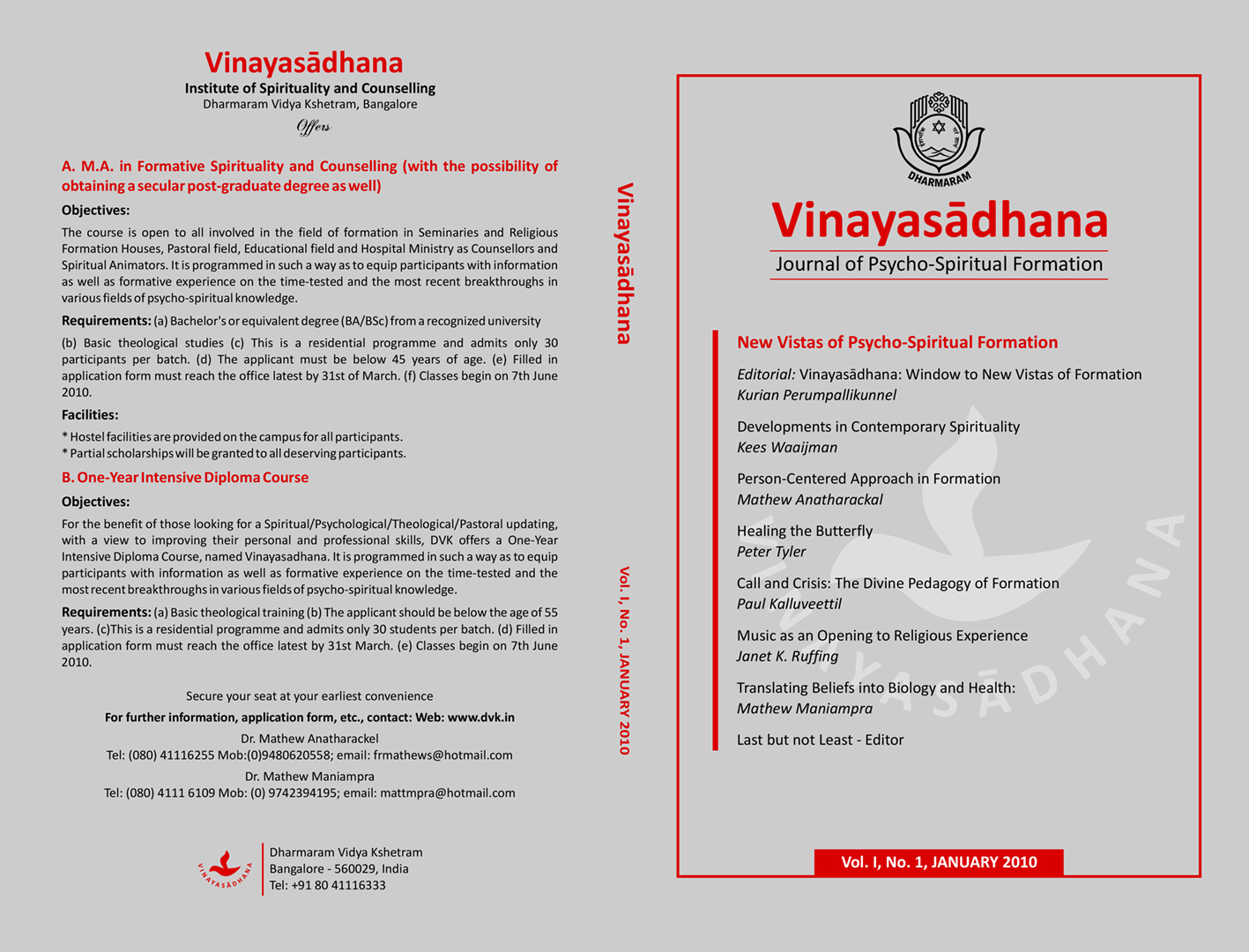Person-Centred Approach in Religious and Priestly Formation
Keywords:
formation, priestly formation, growth in personality, person-centred formation, personal experience, genuinenessAbstract
In person-centred formation the focus of attention is on the candidate. This approach suggests that religious or priestly formation is first and foremost a caring of individuals and not passing on of knowledge to a large group. It is a process of assisting the individual to grow through an evolving personal experience. The Person-centred formator’s role is rooted in being, not doing. The major task of the formator is to provide a climate of safety and trust, which will encourage formees to reintegrate their self actualizing and self-valuing process. Congruence or genuineness is the most basic of the attitudinal condition of a formator. The formator’s unconditional positive regard leads the formee to grow in positive self-regard which leads to further growth in personality.
References
Abraham, P.J., & Parangimalil, B. (1993). Images for Human Wholeness. Bangalore: Pangaya Publications.
Aerthayil, J. ed., (1990). Becoming Disciple: A Training Programme in Gospel Values, Vol.1, Bangalore: Dharmaram Publications.
Anatharackel, M. (2000). Psycho-Spiritual Dimensions of Formation: For Priests and Religious. Bangalore: Dharmaram Publications.
Aring, C.D. (1958). Sympathy and Empathy. Journal of American Medical Association. 167(4): 448-452.
Astley, J. ed. (1996). Theological Perspectives of Christian Formation: A Reader on Theology and Christian Education. Michigan: W.B. Eerdmans Publishing Company.
Bozarth, J.D. (1976) Beyond Reflection: Emergent Modes Of Empathy, Manuscript, Box no.4, Carl Rogers Special Collection Department, Davidson Library California, Santa Barbara: Ucsb.
Brodley, B.T. (1992), Empathic Understanding and Feelings in Client- Centered Therapy. Person Centred Journal, 1(1): 21-32.
Colborn, F. (1969). Grace as Acceptance: A Phenomenological Model for the Theology of Justification (Excerpta ex Dissertation ad Lauream in Facultate Theologica Pontificia Universitatis Gregorianae, Rome: Catholic Book Agency-Officium Liberi Catholici.
Costello, T.J. (1992). The Use of Psychology as an Aid to Priestly Formation. Seminarium, 32(4): 629-636.
Ford, J.G. (1991). Rogerian Self-Actualization: A Clarification of Meaning. Journal of Humanistic Psychology, 31(2):101-111.
Forde, F. (1983). Personal Identity and Religious Commitment, Bombay: St. Paul Publications.
Fuster, J. M. (1991). Growth In Christ: A Practical Method. Bombay: St. Paul Publications.
Gosami, S.D. (1977). Reading in Vedic Literature. Bombay: The Bhaktivedanta Book Trust.
Hara, M.O. (1986). Heuristic Inquiry as Psychotherapy. Pastoral Centered Review, 1(2):
Leslie, R. C. (1965). Jesus and Logotherapy: The Ministery of Jesus as Interpreted Through the Psychotherapy of Victor Frankal. New York: Abingdon Press.
Maciel, M. (1992). Integral Formation of Catholic Priests. New York: Alba House.
May, G.G. (1982). Care of Mind Care of Spirit, San Francisco: Harper and Row Publishers.
Nemeck, F.K., & Coombs, M.T. (1993). The Way of Spiritual Direction. Minnesota: The Liturgical Press.
Patterson, C. H. (1986). The Theories of Counselling and Psychotherapy. 4th Edition. New York: Harper Collins Publishers.
Power, D. (1998). A Spiritual Theology of the Priesthood: The Mystery of Christ and the Mission of the Priest, Edinburgh: T And T Clark.
Rogers, C. R. (1978). Carl Rogers on Personal Power: Inner Strength and its Revolutionary Impact. London: Constable And Company.
Rogers, C. R. (1951). Client-Centered Therapy: Its Current Practice, Implications, and Theory, Boston: Houghton Mifflin Company.
Rogers, C. R. (1995). On Becoming a Person: A Therapist View of Psychotherapy. Boston: Houghton Mifflin Company.
Rogers, C.R. (1995). A Way of Being. Boston: Houghton Mifflin Company.
Rogers, C.R. (1970). Encounter Groups. London: Harper and Row Publishers.
Ruide, M. (1986). Formation in Religious Life. Asian Quest, 1(8): 4.
Van Kaam, A. (1967). Dynamics of Spiritual Direction. New Jersey: Dimension Book.
Woolfe, R. & Dryden, W. (1996). ed., Handbook of Psychology. London: Sage Publications.


